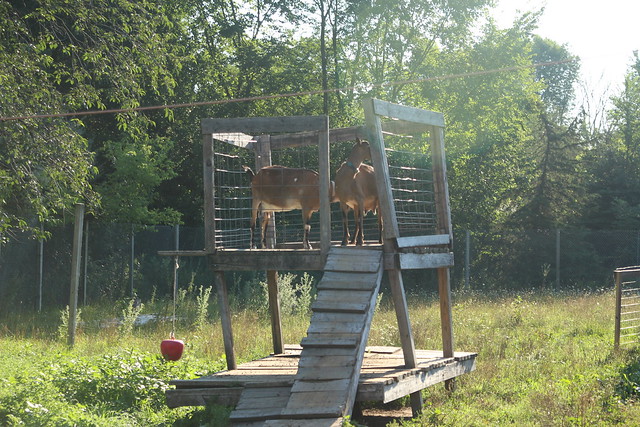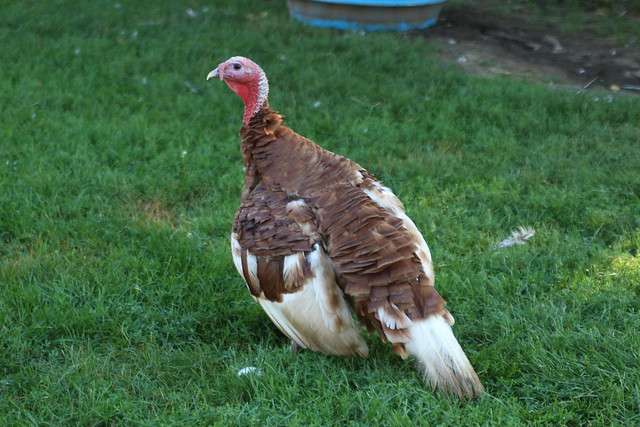
Some people have a natural rapport with animals. This is what you’ll see if you walk around the Lowell Farm & Wildlife Center with Sjana Gordon. “They are not dumb. Not any of them. They all have feelings. They all feel pain.” she explains. Animals including goats, ducks, geese, pigs, chickens, peacocks, and domestic birds come running to greet her as she walks around the facility. Many of them have names. They know her voice. They know what she has done to help them. And they are thankful.
How it Began
Gordon started rescuing animals 23 years ago. She takes in all mammals and reptiles native to Michigan as well as domestic reptiles, birds, and farm animals. Her first rescue was a fawn she discovered during a wedding reception. Since then her organization has become a 501(c)3 and has a permit from the Department of Natural Resources which inspects the center. “You have to have a permit with the DNR to do wildlife. And we have that here. You have to re-up your permit every five years. We have to take their courses that they offer.” Sjana says proudly. She and her core of about eight volunteers also take classes through the International Wildlife Rehabilitation Council. Continuing education is important so she can help animals to the best of her ability.
The Lowell Farm & Wildlife Center is the place to go if you find an animal in need of help. It’s advised that you do not touch a hurt or baby animal. What looks like an animal in distress could be natural behavior. The center’s website offers some tips on what to do but if you’re still not sure contact Sjana who cautions, “Call me first. It is a wild animal so always be careful. Always take precautions to protect yourself because if you pick up a raccoon and it bites you it has to be put down. State law. Try and find us first.”
Farm and Domesticated Animals in Need
Many of the farm animals and domestic birds like cockatiels are rescued after being in an abuse situation or owners not doing research prior taking on an animal. Chicks and ducks are cute and seem like great gifts at Easter but they often become unwanted once the realization of the work involved with caring for these animals as they grow up.
In the past a pig wandering the streets of downtown Grand Rapids found its way to the center. Currently an old sheep is taking up residence after being found wandering around the countryside. Attempts were made to find his owner but no one came forward. Whenever possible animals become available for adoption. Paperwork is filled out and there is a charge to adopt, sometimes significant, to ensure a person looking to adopt is serious about the responsibility and commitment.
Some of the rescued animals remain at the center. Female goats that are brought in are usually kept for their milk, which is mixed with formula when feeding baby raccoons, squirrels, and fawns.
Wildlife Help and Release
Raccoons and deer are released back into the same county where they were found. Deer and possum are released in state game area. These are hard releases where the animal is let go and left to acclimate on its own. Squirrels usually get a soft release where they’re in a cage that’s left open during the day and closes at night. It’s up to the animal to decide when to go back into the wild. The public is unable to see any of the baby wildlife being cared for unless their eyes are closed. This DNR regulation helps ensure minimal contact with humans resulting in an easier transition back into the wild.
The center isn’t able to save every animal it helps. There’s also heartbreak. And Gordon’s okay with that. But we’re told there are also tears of joy each year when all the babies being cared for are ready to return home. In fact she says, “When I stop having the compassion, that’s when I need to quit.”
An Endangered Find
While most of the wildlife brought to the center are common inhabitants in the state, occasionally a rare find is discovered. A turtle recently found its way to the center. A call was taken about a turtle that was hit on the side of the road. It turns out it was a Blanding’s Turtle which is fully protected in Michigan as an endangered species. After surgery to remove a back leg the turtle has been recovering nicely. She’s able to be taken to the creek to swim and bask in the sun. The center is looking for a sanctuary with a breeding program where this rare find can be safe while helping expand numbers for this kind of turtle.
A Team Effort
Sometimes the most rewarding jobs pay nothing at all. Such is the case with Sjana’s work at the Lowell Farm & Wildlife Center. Her payment is in the form of kisses from animals she is helping. There is no paid staff. Volunteers and members of the community have a role. All of the feed and supplies needed to care for animals comes from donations or purchased with donated funds. Local farms donate, or sell at a reduced price, produce that’s still good but does not meet standards for selling to the public. Any scrap wood, fencing, or building materials are also appreciated. Sjana makes wool rugs which are sold at Christmas Through Lowell, which is their biggest fundraiser.
Spring and late summer are the busiest times with babies in need of help being found, especially after storms. Depending upon the weather conditions during any particular season at least 700 and up to 2,000 animals come through the facility each year. Sjana has does group visits to the center and visits classrooms. If you’re interested learning more about the Lowell Farm & Wildlife Center or are need help rescuing a wild animal visit the Lowell Farm & Wildlife Center’s website where you can also find information about making a monetary or tangible donation. The center’s adoptable animals can be found on their Facebook page.




Leave a Reply